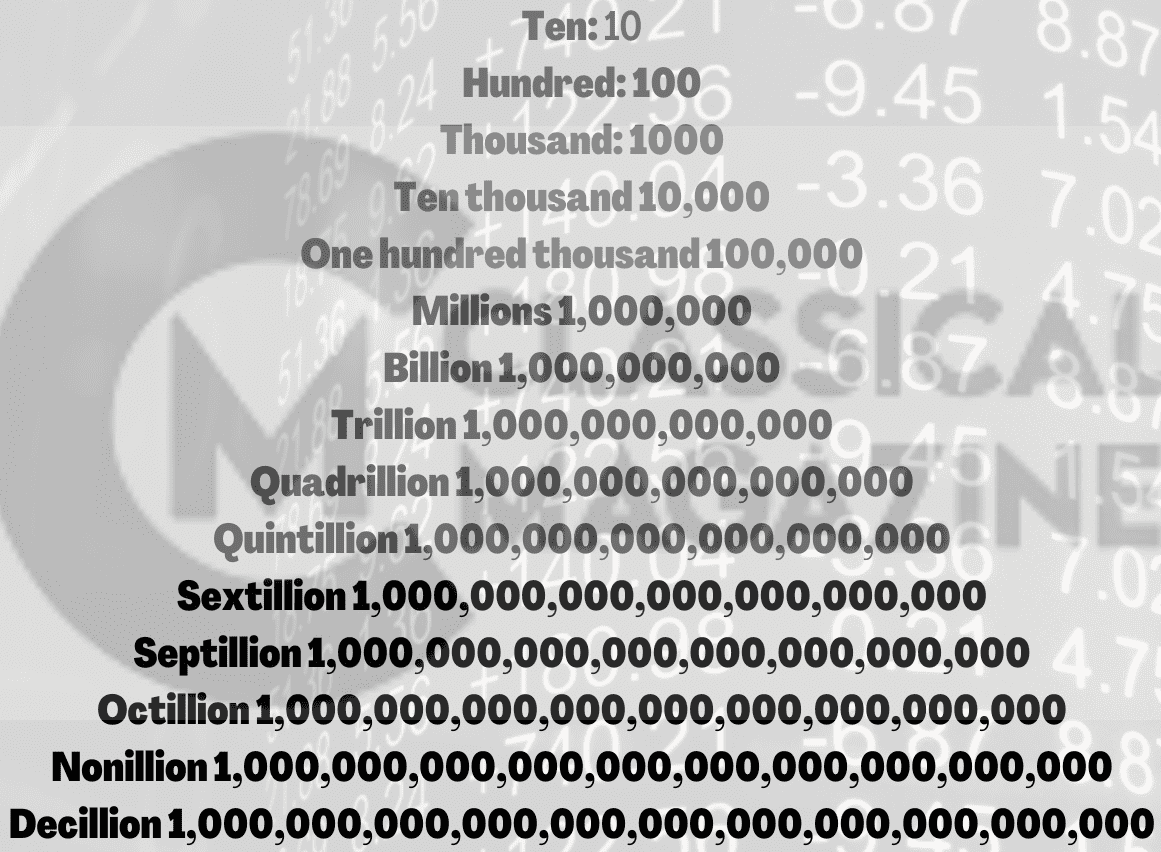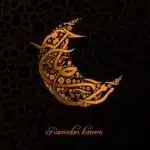Have you ever wondered how many zeros there are in a million? a billion? a trillion? Do you know how many zeros there are in a vigintillion? Someday you’ll need to know it for science or math class. On the other hand, you might just want to impress a friend or teacher.
Numbers Greater Than One Trillion
The digit zero plays an important role when counting very large numbers. It is useful to keep track of these multiples of 10 because the higher the number, the more zeros are needed. In the table below, the first column lists the name of the number, the second gives the number of zeros after the first digit, and the third tells you how many groups of three zeros you would need to write each number.
| Name | Number of Zeros | Groups of (3) Zeros |
|---|---|---|
| Ten | 1 | (10) |
| Hundred | 2 | (100) |
| Thousand | 3 | 1 (1,000) |
| Ten thousand | 4 | (10,000) |
| Hundred thousand | 5 | (100,000) |
| Million | 6 | 2 (1,000,000) |
| Billion | 9 | 3 (1,000,000,000) |
| Trillion | 12 | 4 (1,000,000,000,000) |
| Quadrillion | 15 | 5 |
| Quintillion | 18 | 6 |
| Sextillion | 21 | 7 |
| Septillion | 24 | 8 |
| Octillion | 27 | 9 |
| Nonillion | 30 | 10 |
| Decillion | 33 | 11 |
| Undecillion | 36 | 12 |
| Duodecillion | 39 | 13 |
| Tredecillion | 42 | 14 |
| Quatttuor-decillion | 45 | 15 |
| Quindecillion | 48 | 16 |
| Sexdecillion | 51 | 17 |
| Septen-decillion | 54 | 18 |
| Octodecillion | 57 | 19 |
| Novemdecillion | 60 | 20 |
| Vigintillion | 63 | 21 |
| Centillion | 303 | 101 |
All Those Zeros
A table like the one above can certainly be useful for listing the names of all numbers according to the number of zeros they have. But it can be truly mind-boggling to see what some of these numbers look like. Below is a list, including all zeros, numbers up to the decillion, just over half of the numbers listed in the table above.
- Ten: 10 (1 zero)
- Hundred: 100 (2 zeros)
- Thousand: 1000 (3 zeros)
- Ten thousand 10, 000 (4 zeros)
- One hundred thousand 100, 000 (5 zeros)
- Millions 1,000, 000 (6 zeros)
- Billion 1,000, 000, 000 (9 zeros)
- Trillion 1,000, 000, 000, 000 (12 zeros)
- Quadrillion 1,000, 000, 000, 000, 000 (15 zeros)
- Quintillion 1,000, 000, 000, 000, 000, 000 (18 zeros)
- Sextillion 1,000, 000, 000, 000, 000, 000, 000 (21 zeros)
- Septillion 1,000, 000, 000, 000, 000, 000, 000, 000 (24 zeros)
- Octillion 1,000, 000, 000, 000, 000, 000, 000, 000, 000 (27 zeros)
- Nonillion 1,000, 000, 000, 000, 000, 000, 000, 000, 000, 000 (30 zeros)
- Decillion 1,000, 000, 000, 000, 000, 000, 000, 000, 000, 000, 000 (33 zeros)
Zeros Grouped in Groups of 3
The reference to sets of zeros is reserved for groupings of three zeros, which means that they are not relevant for smaller numbers. We write numbers with commas separating sets of three zeros to make the value easier to read and understand. For example, write one million as 1,000,000 instead of 1000000.
As another example, it is much easier to remember that a trillion is written with four sets of three zeros than to count 12 separate zeros. Although you might think one is pretty simple, expect to have to count 27 zeros for an octillion or 303 zeros for a centillion.
That’s when you’ll realize that you only need to remember nine and 101 sets of zeros, respectively.
Numbers With Very Large Amounts of Zeros
The googol number (termed by Milton Sirotta) is followed by 100 zeros. Here’s what a googol looks like, including all of its required zeros:
10, 000, 000, 000, 000, 000, 000, 000, 000, 000, 000, 000, 000, 000, 000, 000, 000, 000, 000, 000, 000, 000, 000, 000, 000, 000, 000, 000, 000, 000, 000, 000
Do you think this number is large? What about googolplex, which is a follow-up to a googol of zeros? The googolplex is so large that it has no significant use yet: it is larger than the number of atoms in the universe.[su_tooltip title=”Sources” text=”Smith, Roger. ‘Google Means Every.’ Research-Technology Management, vol. 53 no. 1, 2010, pp. 67-69, doi:10.1080/08956308.2010.11657613″ background=”#000000″ color=”#ffffff” shadow=”yes”]¹[/su_tooltip]
Millions and Billions: Some Differences
In the United States, as well as worldwide in science and finance, one trillion equals 1 billion, which is written as one followed by nine zeros. This is also called the “short scale”.
There is also a “long scale”, used in France and previously used in the UK, where a billion means a million million. According to this definition of a billion, the number is written with a one followed by 12 zeros. The short scale and the long scale were described by the French mathematician Geneviève Guitel in 1975.
Read Also:













